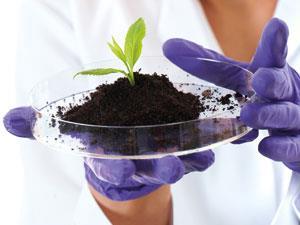Charlotte Ashley-Roberts takes a look at opportunities for chemists in agricultural science
Q: I pride myself on being environmentally aware – not wasting food, water or energy and generally looking after the planet; I even grow most of my own vegetables. Caring for the environment on a personal level is particularly important to me. I have studied chemistry and feel strongly that I want to be able to combine my passion for the environment with my degree. Is this a realistic option?
A: It certainly is. When people ask me about environmental careers I am always glad to tell them there are lots of different routes available, from working for the local environment agency to working for a company that produces sustainable technology. Reading your question, though, I think you might find agricultural chemistry interesting.

Food production is a global issue: we, as a planet, need to produce enough food to feed 9 billion people by 2030. This is something the RSC feels strongly about and is covered in our roadmap strategy. Since the supply of available agricultural land is fixed, there needs to be a massive increase in agricultural productivity. Chemistry will have a significant role to play in achieving this, so your goal is more than realistic: it’s vital.
Top of the crops
Agricultural science is a huge global industry. It focuses on chemical compositions and changes involved in the production, protection and use of crops, and also livestock. It covers everything from processing the raw products that make it into our everyday foods and drinks to environmental monitoring and remediation, to researching the relationships between plants, bacteria and animals and their surroundings. Agricultural chemists study the causes and effects of the biochemical reactions related to plant and animal growth, and seek ways to control these reactions, including the use of chemical products. These products assist in the production of food and include herbicides, fungicides, insecticides, plant growth regulators, fertilisers and animal feed supplements.
But it’s not just about making chemicals. In some cases, you might work with food producers, studying the fertility of the soil, maintaining or improving agricultural yield or improving the quality of the crop or its resistance to pests and diseases. With regard to the latter, breeding and engineering crops through agricultural biotechnology is an area that is growing quickly. Or you could be involved in ensuring that the chemical products above are safe not only for humans but also for the environment as a whole. This may include testing the air, soil, plants and water for chemicals or other breakdown and waste products.
The results of these experiments and research then feed into understanding the effect of chemicals on the environment and help to advise farmers, government and the industry as a whole so that the chemicals we use in our food production are safe and effective.
Green fingers
There’s a lot of variety in this industry, depending on the type of work you are doing. However, synthetic organic and analytical chemistry skills are obviously valuable in making molecules and examining their environmental impact, so if you have a preference for one or both of these topics, that’s a good start.
In the UK, there are quite a few large companies and agencies that work in this area such as Syngenta, Farm Advisory Services Team, Dow Agrosciences, BASF Biocides, Bayer Crop Sciences, the Department for Environment, Food and Rural Affairs and the Environment Agency. It’s also a very active area of research in academic institutions, notably the John Innes Centre and the University of Aberdeen.
I don’t know where you are based but the agricultural sector is well represented across the UK and it’s likely you will find a company nearby. To find out more about this sector, you can get involved with the RSC’s Agricultural Sector interest group. You can join this through MyRSC or through the membership section of the RSC’s web site.
If you have more advice you’d like to share about this month’s question —
or have your own career conundrum for Charlotte — please write to chemistryworldjobs@rsc.org












No comments yet